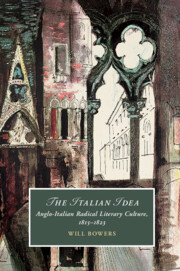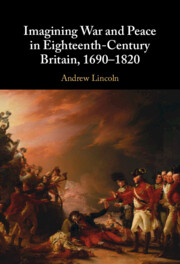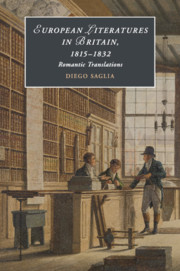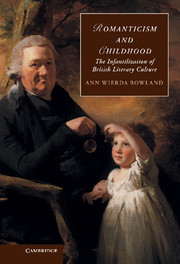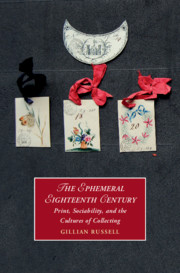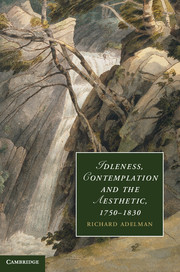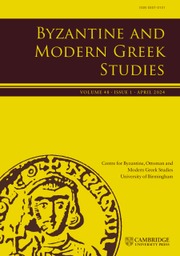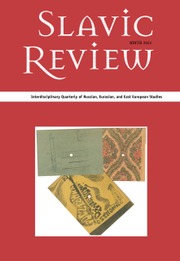The Italian Idea
Anglo-Italian Radical Literary Culture, 1815–1823
Part of Cambridge Studies in Romanticism
- Author: Will Bowers, Queen Mary University of London
- Date Published: February 2022
- availability: Available
- format: Paperback
- isbn: 9781108741378
Paperback
Other available formats:
Hardback, eBook
Looking for an examination copy?
This title is not currently available for examination. However, if you are interested in the title for your course we can consider offering an examination copy. To register your interest please contact [email protected] providing details of the course you are teaching.
-
From 1815 to 1823 the Italian influence on English literature was at its zenith. While English tourists flocked to Italy, a pervasive Italianism coloured many facets of London life, including poetry, periodicals, translation, and even the Queen's trial of 1820. In this engaging study Will Bowers considers this radical interaction by pursuing two interrelated analyses. The first examines the Italian literary and political ideas absorbed by Romantic poets, particularly Lord Byron, Leigh Hunt, and Percy Bysshe Shelley. The second uncovers the ambassadorial role played in London by Italians, such as Serafino Buonaiuti and Ugo Foscolo, who promoted a revolutionary idea of their homeland and its literature, particularly Dante's Commedia. This dual-perspective study reveals the cosmopolitan challenge to Regency mores embodied in both the work of Italian literary exiles in London and the English poetic engagement with Italy.
Read more- Provides an original perspective on how influential Italian ideas radicalised English Romantic poets between 1815 and 1823
- Offers new readings of work by writers including Leigh Hunt, Lord Byron, and Percy Bysshe Shelley based on archival research of their Italian reading, and original manuscript research
- Enters into a comprehensive discussion of the Italian poetry and philosophy that was at the centre of a Regency counter-culture
Awards
- Winner, The 2022 ESSE Book Award for Junior Scholars for a book in the field of Cultural and Areas Studies in English, The European Society for the Study of English
Reviews & endorsements
‘As an ambitious and challenging reflection on the wider implications of the Anglo-Italian cultural interaction in the early nineteenth century, The Italian Idea makes a significant contribution to the field of Anglo-Italian studies and literary history. It exemplifies a new kind of intellectual and political awareness - more trans-European and less national - of the radical writers of the time. But the real strength of this study lies in the range of Bowers' erudition.’ Maria Schoina, Review 19
See more reviews‘The volume is clearly structured, each chapter is introduced by a short introductory overview and written in a captivating style … The conclusion leaves the reader feeling that the author could provide a continuation to this impressive and learned study …’ Antonella Braida, The Review of English Studies
‘A hugely significant contribution to scholarship in this area, The Italian Idea sketches a variegated map, valuable both for the broader directions of travel it indicates and for the insights into seemingly accessory features … A rewardingly rich and continuously stimulating read, Bowers’s The Italian Idea invites us to plunge into a short and fervid cultural-ideological phase in order to recover the full extent of one of the most distinctive facets of Italia romantica in British culture of the Romantic age.’ Diego Saglia, Modern Philology
‘This meticulous survey carefully contextualizes second-generation British Romantic writers' texts … proving that a study of Anglo-Italian cross-currents provides additional insights … One of this study's great strengths is the wealth of diverse material Bowers welds together, combining reflections on authors' influence; rhyme schemes; sub-genres such as romance, the satirical mode, history, translation; mediator figures; and even advertising (in Beppo) to add new angles of analysis.’ Susanne Schmid, The BARS Review
‘Rather than a hot-chronology, or a snapshot, Bowers offers the reader what I like to think of as an impressive diorama of English and Italian engagement. The pieces move in unanticipated and previously unapprehended ways, there are hidden corners and strange shadows, and we know that it is selective, but that is why it works. It is a rare thing to discover such a learned and gracefully written book as this.’ Bysshe Inigo Coffey, The Wordsworth Circle
'The Italian Idea offers a fine contribution to the strong and durable critical interest in Anglo-Italian relations during the period. Particularly effective is Bowers's telescoping mode of inquiry, one that allows him to move nimbly between insightful close readings of individual works and a contextual regard for the complex ways that these works are warmed by the fading revolutionary coals of the post-Waterloo years.' John Bugg, Keats-Shelley Journal
‘Bowers is rigorous in his historical and political contextualization, yet it is through his meticulous close readings, mastery of poetic forms, metre, and styles, as well as his ear to linguistic allusions, coupled with eye-opening archival discoveries, that new complexities of radical Anglo-Italian interactions emerge, and unexpected conversations between texts and contexts come to light for the first time … The field of Anglo–Italian scholarship has traditionally been prone to a heavy reliance on biographical or political readings of texts; on the contrary, Bowers’s rigorous formal analysis and technical brilliance, grounded in archival research and historical accuracy, set refreshingly new standards, both in Anglo–Italian studies and in Romanticism at large.’ Elisa Cozzi, The Keats-Shelley Review
Customer reviews
Not yet reviewed
Be the first to review
Review was not posted due to profanity
×Product details
- Date Published: February 2022
- format: Paperback
- isbn: 9781108741378
- length: 297 pages
- dimensions: 227 x 152 x 16 mm
- weight: 0.434kg
- availability: Available
Table of Contents
1. Italians and the 'public mind' before 1815
2. The genesis of an Italian style
3. Foscolo, Hobhouse, and Holland House
4. Venice redefined
5. An almost revolutionary queen
6. Sailing in the wind's eye.
Sorry, this resource is locked
Please register or sign in to request access. If you are having problems accessing these resources please email [email protected]
Register Sign in» Proceed
You are now leaving the Cambridge University Press website. Your eBook purchase and download will be completed by our partner www.ebooks.com. Please see the permission section of the www.ebooks.com catalogue page for details of the print & copy limits on our eBooks.
Continue ×Are you sure you want to delete your account?
This cannot be undone.
Thank you for your feedback which will help us improve our service.
If you requested a response, we will make sure to get back to you shortly.
×
